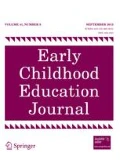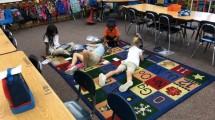Abstract
This study explored the effects of literacy-rich sociodramatic guided play on kindergarten student literacy performance and behavior. Kindergarten students of varying socioeconomic status attending two elementary schools in the same school district participated in this repeated measures, counterbalanced design study. Students received the mandated grade-level literacy instruction with a supplemental 15 min block of time designated for play-based literacy integration during which the intervention took place. During this short time, students working in small groups were given materials (miniature items, toys, letter tiles) to practice initial letter sounds and consonant–vowel–consonant rhyming word families using either an assigned activity (control condition) or a student-invented game that practiced the same literacy concepts (experimental activity). Students instructed through the experimental condition scored significantly better on the Dynamic Indicators of Basic Early Literacy Skills (DIBELS) assessment with a medium effect size. Additional positive academic results included practice in story-composing, sequencing ideas into a complex cause and effect chain of events; application of new vocabulary; repeated practice of phonics and phonemic awareness skills to new examples; self-regulation of emotions; communication and negotiation with peers; and imagination, fantasy, humor, and creativity. Students evidenced preference for the experimental condition, continuing to repeat their games during recess or free time and to record them in their journals. Examples of student-generated literacy games are provided.


Similar content being viewed by others
References
Bredekamp, S. (2005). Play and school readiness. Educational Perspectives, 38(1), 18–26.
Carlson, S. M., Zelazo, P. D., & Faja, S. (2013). Executive function. In P. D. Zelazo (Ed.), Oxford handbook of developmental psychology (Vol. 1, pp. 706–743). Oxford: Oxford University Press.
Chien, N. C., Howes, C., Burchinal, M., Pianta, R. C., Ritchie, S., Bryant, D. M., … Barbarin, O. A. (2010). Children’s classroom engagement and school readiness gains in prekindergarten. Child Development, 81(5), 1534–1549.
Cohen, J. (1988). Statistical power analysis for the behavioral sciences (2nd edn.). Hillsdale: Lawrence Erlbaum Associates.
Dennis, L. R., & Stockall, N. (2015). Using play to build the social competence of young children with language delays: Practical guidelines for teachers. Early Childhood Education Journal, 43(1), 1–7.
Diamond, A. (2016). Why improving and assessing executive functions early in life is critical. In J. A. Griffin, P. McCardle & L. S. Freund (Eds.), Executive function in preschool age children: Integrating measurement, neuro development and translational research (pp. 11–38). Washington: American Psychological Association.
Dickinson, D. K., & Porche, M. V. (2011). Relation between language experiences in preschool classrooms and children’s kindergarten and fourth-grade language and reading abilities. Child Development, 82(11), 870–886.
FastBridge. (2016). Formative Assessment System for Teachers (FAST): Abbreviated technical manual for Iowa 2015–2016. Retrieved from https://www.aea267.k12.ia.us/system/assets/uploads/files/2974/fastbridge_learning_abbreviated_iowa_technical_manual_version_2_0_final.pdf.
Graue, E. (2009). Reimagining kindergarten: Restoring a developmental approach when accountability demands are pushing formal instruction on the youngest learners. School Administrator, 66(10), 10–15.
Herbert, J., & Stipek, D. (2005). The emergence of gender differences in children’s perceptions of their academic competence. Journal of Applied Developmental Psychology, 26(3), 276–295.
Hirsh-Pasek, K., Michnick Golinkoff, R., Berk, L., & Singer, D. G. (2009). A mandate for playful learning in preschool. New York: Oxford.
Kaminski, R., Cummings, K. D., Powell-Smith, K. A., & Good, R. H. III (2008). Best practices in using Dynamic Indicators of Basic Early Literacy Skills for formative assessment and evaluation. In A. Thomas & J. Grimes (Eds.), Best practices in school psychology V (pp. 1181–1204). Bethesda: National Association of School Psychologists.
Kaminski, R. A., & Good, R. H. (1998). Assessing early literacy skills in a problem solving model: Dynamic Indicators of Basic Early Literacy Skills. In M. R. Shinn (Ed.), Advanced applications of curriculum-based measurement (pp. 113–142). New York: Guilford.
Lepola, J., Lynch, J., Kiuru, N., Laakkonen, E., & Niemi, P. (2016). Early oral language comprehension, task orientation, and foundational reading skills as predictors of grade 3 reading comprehension. Reading Research Quarterly Early View. doi:10.1002/rrq.145.
Lillard, A. S., Lerner, M. D., Hopkins, E. J., Dore, R. A., Smith, E. D., & Palmquist, C. M. (2013). The impact of pretend play on children’s development: A review of the evidence. Psychological Bulletin, 139(1), 1–34.
Massey, S. (2013). From the reading rug to the play center: Enhancing vocabulary and comprehensive language skills by connecting storybook reading and guided play. Early Childhood Education Journal, 2(41), 125–131.
McMillan, J. H. (2012). Education research: Fundamentals for the consumer. Boston: Pearson Education Inc.
Miller, E., & Almon, J. (2009). Crisis in the kindergarten: Why children need to play in school. College Park, MD: Alliance for Childhood. ERIC Document Information System No. ED 504839.
Roskos, K. A., & Christie, J. F. (2013). Gaining ground in understanding the play-literacy relationship. American Journal of Play, 6(1), 82–97.
Stipek, D. (2006). No child left behind comes to preschool. The Elementary School Journal, 106(5), 455–466.
Tsao, Y. L. (2008). Using guided play to enhance children’s conversation, creativity, and competence in literacy. Education, 128(3), 515–520.
van der Aalsvoort, G. M., Lepola, J., Overtoom, L., & Laitinen, S. (2015). Motivation of young students: A cross-cultural evaluation of a model for motivational orientations. Research Papers in Education, 30(1), 114–131.
Weisberg, D.S., Hirsh-Pasek, K., & Golinkoff, R.M. (2013). Guided play: Where curricular goals meet a playful pedagogy. Mind, Brain, and Education, 7(2), 104–112.
Whitebread, D., Coltman, P., Jameson, H., & Lander, R. (2009). Play, cognition and self regulation: What exactly are children learning when they learn through play. Educational and Child Psychology, 26(2), 40–52.
Acknowledgement
The authors thank the Center for Educational Transformation at the University of Northern Iowa for generous support of this research project.
Author information
Authors and Affiliations
Corresponding author
Rights and permissions
About this article
Cite this article
Cavanaugh, D.M., Clemence, K.J., Teale, M.M. et al. Kindergarten Scores, Storytelling, Executive Function, and Motivation Improved through Literacy-Rich Guided Play. Early Childhood Educ J 45, 831–843 (2017). https://doi.org/10.1007/s10643-016-0832-8
Published:
Issue Date:
DOI: https://doi.org/10.1007/s10643-016-0832-8




